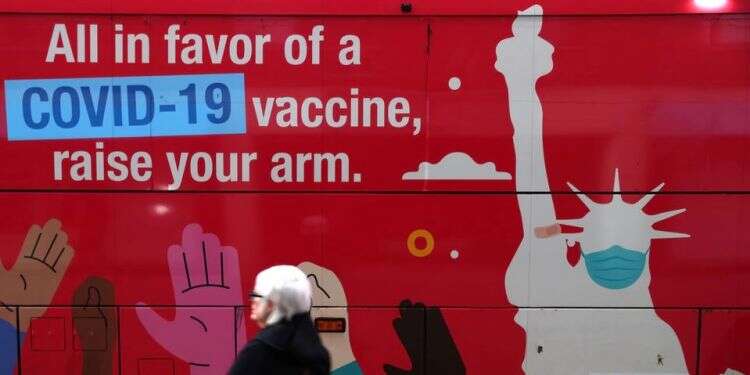The coronavirus reproduction rate continued to rise on Wednesday and currently stands at 1.09, according to Health Ministry data published on Thursday morning. Of the 103,051 Israelis screened for the virus in the past 24 hours, 651 (0.69%) tested positive.
Follow Israel Hayom on Facebook and Twitter
There are 5,971 active cases in the country – the lowest it has been since July 24th – with 134 patients hospitalized. Of those, 96 are in serious condition.
Israel has reported 1,348,486 COVID cases since the outbreak of the pandemic last year, including 8,210 deaths. Thus far, 4,112,353 Israelis over the age of 16 have been fully inoculated, 5,786,594 received two shots, and 6,389,878 got one jab.
Also on Thursday, Prime Minister Naftali Bennett and Health Minister Nitzan Horowitz met with health officials to discuss the Omicron situation in the country. It was decided, among other things, to increase enforcement of the "green pass" vaccination certificates with immediate fines issued against violators, with efforts to be led by the Public Security Ministry and the Israel Police.
Bennett also instructed officials to examine options for imposing restrictions on unvaccinated Israelis. As for the two-week travel ban that the government imposed on foreigners amid efforts to curb the spread of Omicron in the country, officials are scheduled to meet again later on Thursday.
In related news, Health Ministry officials mandated on Wednesday a 14-day self-isolation period for returnees from abroad that test positive for Omicron, in contrast to the 10-day obligatory quarantine that was practiced until now with other strains.
"The change is due to the suspicion that verified Omicron cases may be contagious for a longer than observed cases of other variants," the ministry explained.
Israel currently has 21 verified Omicron cases, 16 of whom are returnees from South Africa, Britain, France, or the United Arab Emirates. The other five confirmed cases came into contact with verified individuals who returned from South Africa or the United States.
Of the 21 individuals, eight have either not been inoculated at all, recovered from COVID over six months ago, or received the first or second vaccine shots over half a year ago. The other 13 are fully inoculated, meaning they received their booster shots. Officials suspect another 21 Omicron cases. The individuals are currently awaiting their test results.
Also on Wednesday, British Prime Minister Boris Johnson announced tighter restrictions to stem the spread of Omicron in the country, urging people to again work from home and mandating COVID vaccination passes for entrance into nightclubs and large events.
"It has become increasingly clear that Omicron is growing much faster than the previous Delta variant and is spreading rapidly all around the world," Johnson said in a press conference. "Most worryingly, there is evidence that the doubling time of Omicron could currently be between two and three days."
According to Johnson, 568 Omicron cases have been confirmed so far across the country, and "the true number is certain to be much higher."
He said while there was not yet comprehensive data on how dangerous Omicron is, rising hospitalization rates in South Africa, where the variant was first detected, suggested it has the potential to cause harm.
Britain reported 51,342 new COVID cases on Wednesday, with 161 more people dying. Overall the country has seen over 146,000 deaths since the outbreak of the pandemic, the second-worst death toll in Europe after Russia.
The announcement came as Johnson and his government faced increasing pressure to explain reports that Downing Street staff enjoyed a Christmas party that breached the country's coronavirus rules last winter when coronavirus cases soared and people were banned from holding most social gatherings. Johnson on Wednesday ordered an inquiry and said he was "furious" about the situation.
The revelations have angered many in Britain, with critics saying they heavily undermine the authority of Johnson's Conservative government in imposing virus restrictions.
Subscribe to Israel Hayom's daily newsletter and never miss our top stories!
In the United States, the number of Americans fully vaccinated against COVID reached 200 million on Wednesday amid a dispiriting holiday-season spike in cases and hospitalizations that hit even the most highly inoculated areas in the country.
New cases climbed from an average of nearly 95,000 a day on Nov. 22 to almost 119,000 a day this week, and hospitalizations are up 25% from a month ago. The increases are due almost entirely to the Delta variant, though Omicron has been detected in about 20 states and is sure to spread even more.
Deaths are running close to 1,600 a day on average, back up to where they were in October. And the overall US death toll less than two years into the crisis could hit another heartbreaking milestone, 800,000, in a matter of days.
The cold weather, Thanksgiving gatherings, and a big rebound in holiday travel are all believed to be playing a role, along with public weariness with pandemic restrictions.
Demand for the vaccine – with the recent approval of boosters for all adults and shots for elementary school children – has been high amid the surge and the emergence of Omicron, whose dangers are still not fully understood. On Wednesday, Pfizer said that the initial two shots of its vaccine appear significantly less effective against Omicron but that a booster dose may offer important protection.
Meanwhile, South Africa reported nearly 20,000 cases on Wednesday, a record since the new strain was identified, and 36 COVID-related deaths.
It was not immediately clear how many of the infections were caused by Omicron, given only a fraction of samples are sequenced, but experts believe it is driving South Africa's fourth wave of infections.
The statistics from the National Institute for Communicable Diseases brought the confirmed number of cases in the country to 3.071 million, with more than 90,000 COVID deaths since the pandemic started.
Early evidence suggests Omicron is more transmissible than any previous variant, but that symptoms may be less severe, with lower levels of hospitalization, especially in vaccinated patients.




